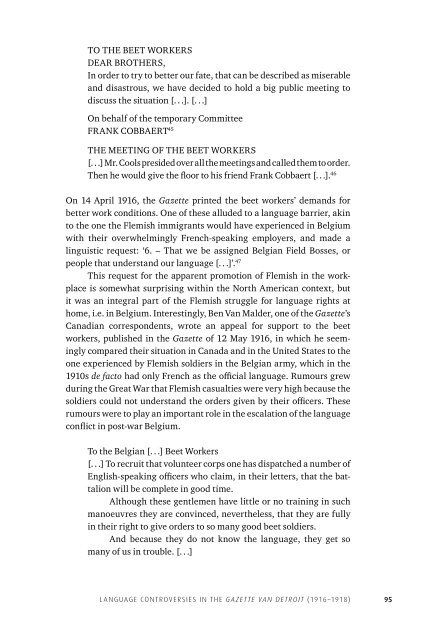Discord Consensus
7aze300jFJo
7aze300jFJo
You also want an ePaper? Increase the reach of your titles
YUMPU automatically turns print PDFs into web optimized ePapers that Google loves.
TO THE BEET WORKERS<br />
DEAR BROTHERS,<br />
In order to try to better our fate, that can be described as miserable<br />
and disastrous, we have decided to hold a big public meeting to<br />
discuss the situation [. . .]. [. . .]<br />
On behalf of the temporary Committee<br />
FRANK COBBAERT 45<br />
THE MEETING OF THE BEET WORKERS<br />
[. . .] Mr. Cools presided over all the meetings and called them to order.<br />
Then he would give the floor to his friend Frank Cobbaert [. . .]. 46<br />
On 14 April 1916, the Gazette printed the beet workers’ demands for<br />
better work conditions. One of these alluded to a language barrier, akin<br />
to the one the Flemish immigrants would have experienced in Belgium<br />
with their overwhelmingly French-speaking employers, and made a<br />
ling uistic request: ‘6. –That we be assigned Belgian Field Bosses, or<br />
people that understand our language [. . .]’. 47<br />
This request for the apparent promotion of Flemish in the workplace<br />
is somewhat surprising within the North American context, but<br />
it was an integral part of the Flemish struggle for language rights at<br />
home, i.e. in Belgium. Interestingly, Ben Van Malder, one of the Gazette’s<br />
Canadian correspondents, wrote an appeal for support to the beet<br />
workers, published in the Gazette of 12 May 1916, in which he seemingly<br />
compared their situation in Canada and in the United States to the<br />
one experienced by Flemish soldiers in the Belgian army, which in the<br />
1910s de facto had only French as the official language. Rumours grew<br />
during the Great War that Flemish casualties were very high because the<br />
soldiers could not understand the orders given by their officers. These<br />
rumours were to play an important role in the escalation of the language<br />
conflict in post-war Belgium.<br />
To the Belgian [. . .] Beet Workers<br />
[. . .] To recruit that volunteer corps one has dispatched a number of<br />
English-speaking officers who claim, in their letters, that the battalion<br />
will be complete in good time.<br />
Although these gentlemen have little or no training in such<br />
manoeuvres they are convinced, nevertheless, that they are fully<br />
in their right to give orders to so many good beet soldiers.<br />
And because they do not know the language, they get so<br />
many of us in trouble. [. . .]<br />
LANGUAGE CONTROVERSIES IN THE GAZETTE VAN DETROIT (1916–1918)<br />
95


